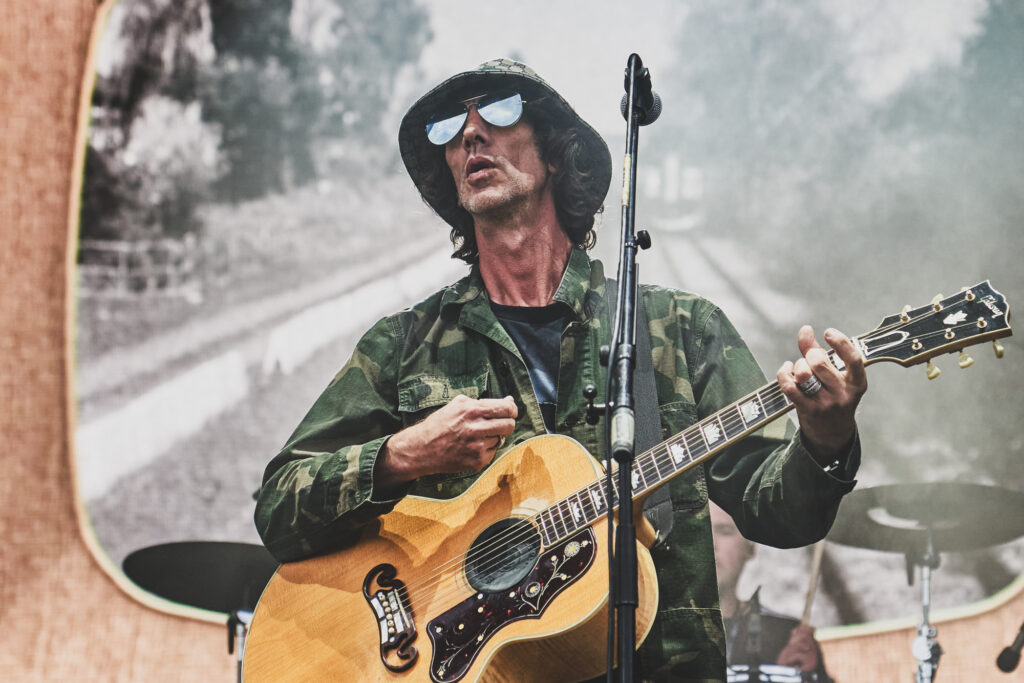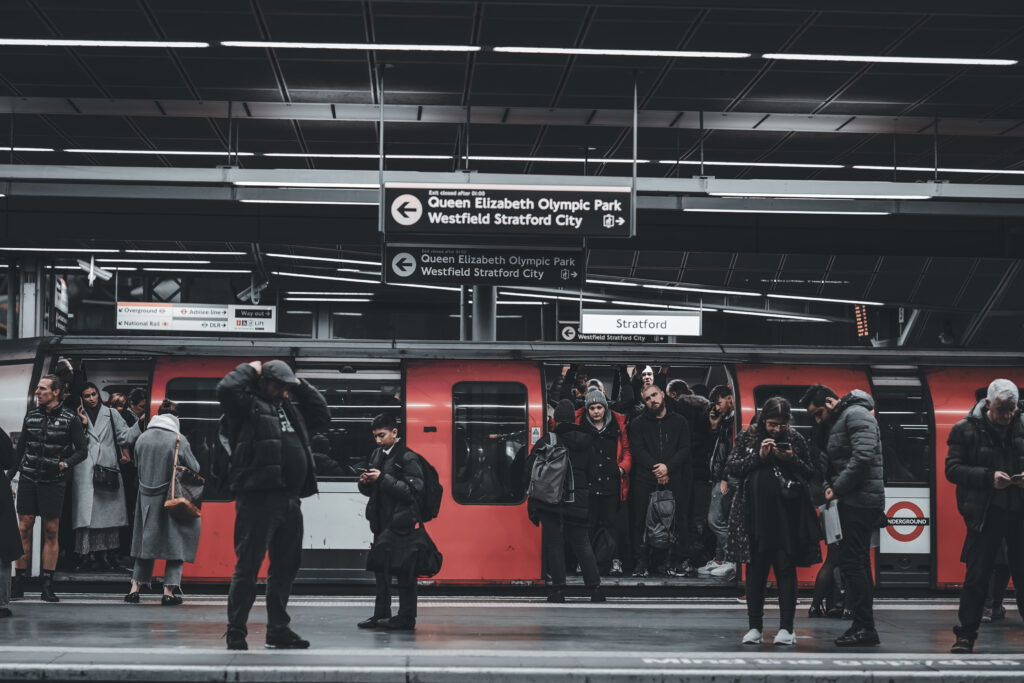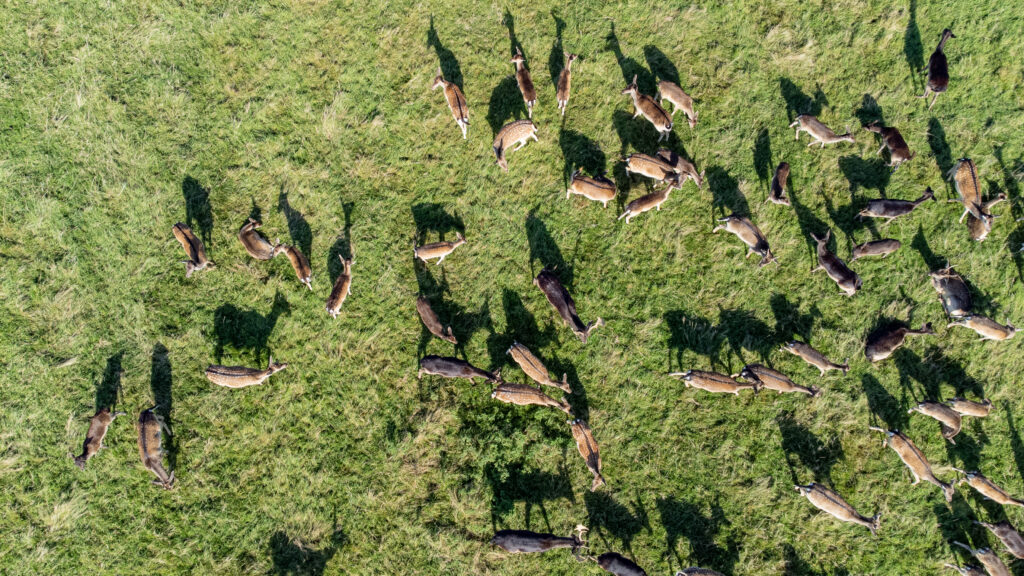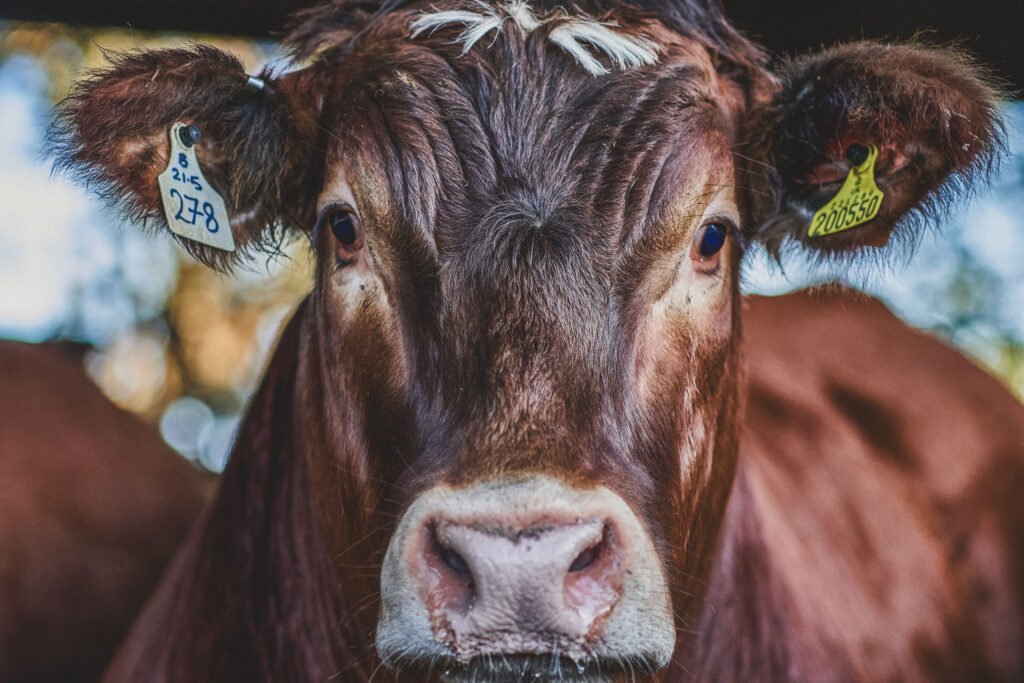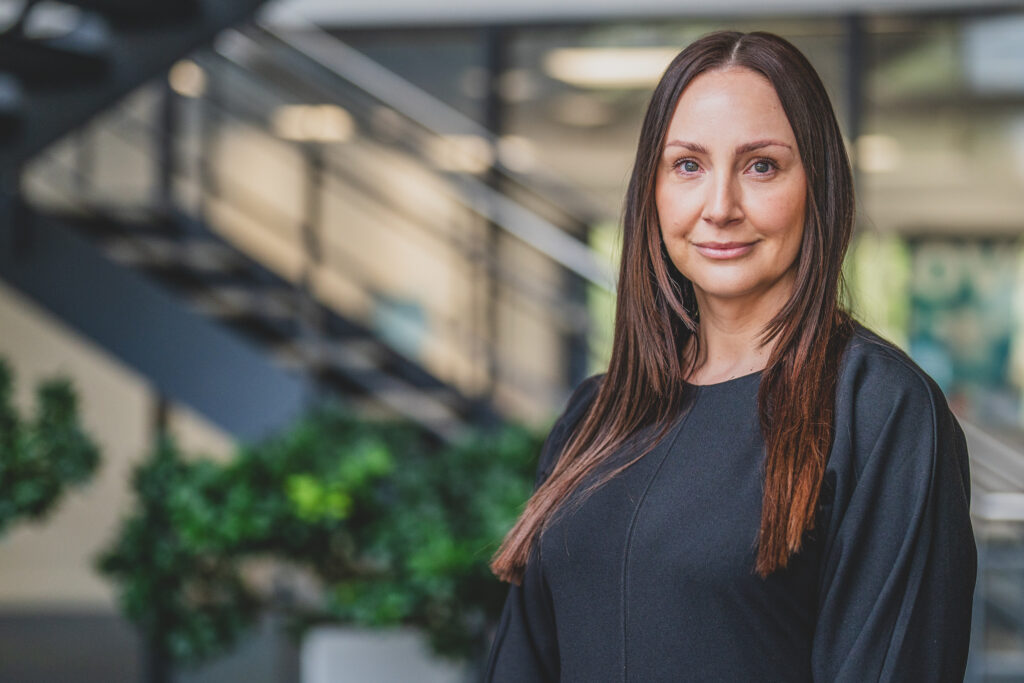Will Sustainable Video Production be the Future?
In an era where climate change and sustainability are at the forefront of global conversation, I thought it would be a poignant time to look at how the videography industry can play its part through Sustainable Video Production.
As filmmakers and content creators, we have a responsibility to not only tell compelling stories but also to do so in a way that minimises our environmental footprint.
As we look towards the next decade, the impacts of global warming look catastrophic as the if we don’t take immediate action to reduce our carbon footprints. If the current rate of greenhouse gas emissions continues unabated, we are likely to witness more extreme weather with hurricanes, droughts, and heatwaves, becoming more frequent and intense.
These events can cause significant damage to our infrastructure, agriculture, and water supplies, leading to devastating consequences for human health and economies. Moreover, global warming threatens the delicate balance of our planet’s biodiversity.
As habitats change or disappear due to rising temperatures, many species may not be able to adapt quickly enough, leading to an increased rate of extinction. This loss of biodiversity could disrupt ecosystems and the services they provide, such as pollination, clean water, and disease control.
In essence, if we fail to take global warming seriously, the world in ten years could be markedly different and more hostile than the one we live in today.
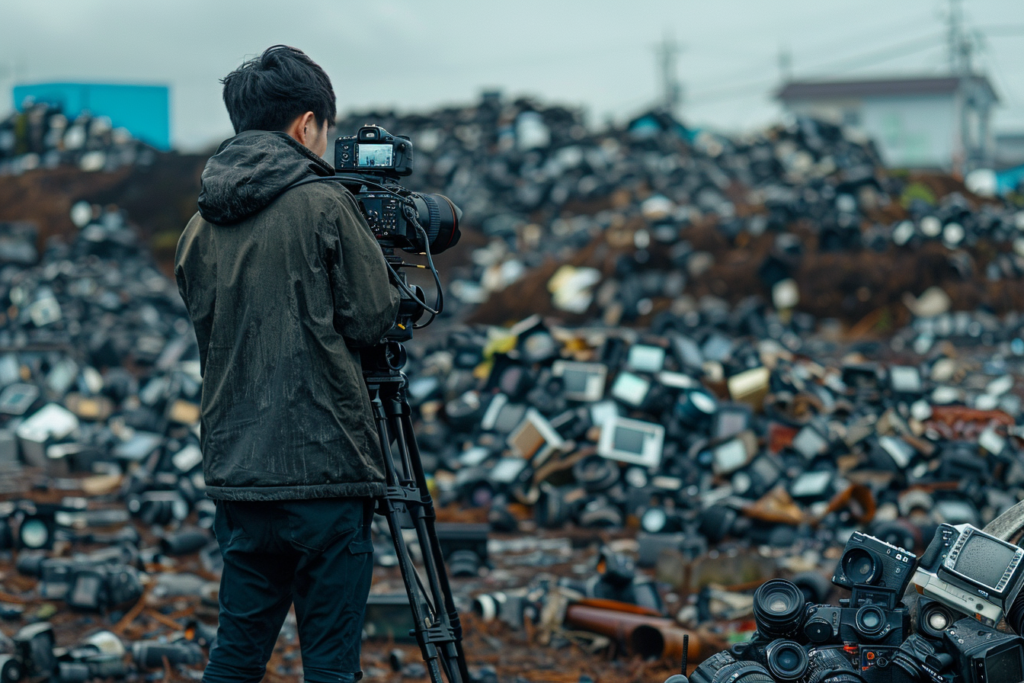
What has this got to do with the Film Industry
Behind every film and TV production are talented professionals, Set Designers, The Costume Department, Carpenters, Caterers, Sound, Vision, Hair, Make-Up, Riggers… The list is endless. In fact, The average number of crew credits in the top 1,000 films between 1994 and 2013 was 588.
On average, the top films of the past two decades have each had 3.5 writers, 7 producers, 55 people in the art department, 32 in sound, 55 in camera / electrical and 156 in visual effects.an average film set.
While we don’t have real-time data or specific statistics, we can share some general insights on the film industry’s environmental impact based on the information available up until September 2021.
Sustainability in the entertainment industry has always had its problems.
In the United Kingdom alone, a single hour of television production produces a shocking 13 metric tons of carbon dioxide – equivalent to the annual emissions of an average American.
The situation is even worse in the United States, where the environmental impact of film production and the TV industry emits a staggering 15 million tons of CO2. When you consider how much the film industry contributes to global warming and climate change, the importance of Sustainable Video Production becomes a necessity. One of the primary contributors is energy usage.
For example, a 2006 study from the UCLA Institute of the Environment and Sustainability found that the film and television industry in Los Angeles alone generated around 140,000 tons of ozone and diesel particulate matter emissions annually.
Another significant factor is travel. Cast, crew, and equipment often need to be transported to various locations, sometimes internationally, leading to substantial carbon emissions.
Waste production is another issue. A 2014 report by the Producers Guild of America indicated that a typical 60-day shoot can produce up to 55 tons of waste, much of which ends up in landfills.
These figures highlight the substantial environmental impact of the film industry. However, many in the industry are now recognising this issue and taking steps to implement Sustainable Video Production and have implemented more sustainable practices.

How Would Sustainable Video Production Work?
One example of Sustainable film production companies including Filming in England, who work as the lead body for film in the UK, the BFI and its partners embrace best practice and take seriously responsibility to co-ordinate a UK-wide sustainability strategy for all parts of the film sector.
The BFI’s first-of-its-kind sustainability report sets out a route map to help film production transition to net zero emissions by 2050.
Produced as a collaboration between the BFI’s Research and Statistics Fund which is supported by the National Lottery, the BAFTA-led consortium Albert and Arup, A Screen New Deal is the first study of its kind for the film industry.
SIPA The Sustainability in Production Alliance.
They are a sustainable production alliance community of live production professionals who share the belief that our industry must embrace sustainability to ensure its future. Creating an industry that works towards the triple bottom line of People, Planet, and Profit. SiPA is formed of individuals from all sectors of our industry, at all levels of the supply chain and at all stages of the production life-cycle.
Eco-Friendly Equipment
Film equipment can be made eco-friendly by utilising sustainable materials and energy-efficient technologies. For instance, companies could opt for cameras made with recycled or biodegradable materials to reduce waste.
Lighting, a crucial part of film production, could be made more environmentally friendly by using LED lights which consume less power than traditional lighting systems.
Additionally, solar-powered generators could replace conventional ones for outdoor shoots to reduce carbon emissions. Portable chargers for batteries and devices could also be solar-powered.
Moreover, digital technology can help eliminate the need for physical film, reducing material use and waste. Therefore, the adoption of eco-friendly practices in the manufacturing and use of film equipment can significantly contribute to the sustainability of the film industry.
The only downside is cost. Recycling comes with its;s own costs and creating industry standard equipment with recycles materials is likely to be problematic and prices would likely be higher than existing new technology.
Reducing waste using a sustainable film set.
Reducing waste and helping the planet on a film set can be achieved through several strategies:
1. Go Digital: Using digital scripts instead of paper ones is an instant fix in Sustainable Video Production. This not only reduces paper waste but also makes distribution and updating easier.
2. Reusable Props and Sets: Rather than disposing of sets and props after use, they can be stored for future productions or donated to local theaters and schools.
3. Eliminate Single-Use Items: Avoid using disposable water bottles, plates, and cutlery. Encourage cast and crew to bring their reusable items or provide them on set.
4. Recycle and Compost: Set up recycling stations around the set for paper, plastic, and metal waste. If food is catered, consider setting up a composting system for organic waste.
5. Sustainable Catering: Choose caterers who use locally-sourced, organic food. This supports local businesses and reduces the carbon footprint associated with transporting food long distances.
6. Educate and Communicate: Make sure everyone on the set knows about Sustainable Video Production, green initiatives and why they’re important. This encourages everyone to participate and can help foster a culture of sustainability in the film industry.
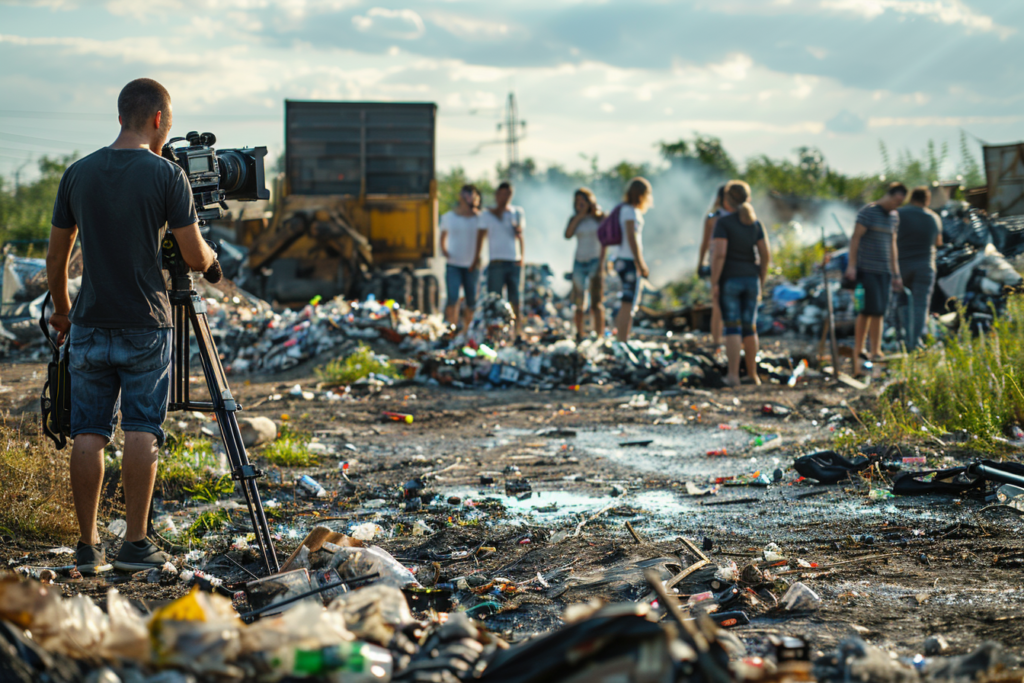
Local Filming Locations
Film companies should consider using local sets for several reasons. Local sets often require less travel, which can significantly reduce transportation costs. Using local sets reduces the carbon footprint associated with long-distance travel, making the production more eco-friendly. Filming in the actual location where the story is set can add authenticity to the film. It can provide a realistic backdrop that can’t be replicated on a soundstage.
Local Economies get a boost. Filming locally can bring money into the local economy. Hiring local crew, using local services, and promoting the location can all have positive impacts on the area. One big asset is Community EngagementFilming locally can foster a sense of community engagement and pride, as residents see their hometown featured on screen.
Sustainable Video Production can save money, promote sustainability, and contribute positively to local economies.
Green Set Design
Set design can also play a role in sustainable videography. Consider using recycled materials or opting for digital set designs where possible. When physical sets are necessary, ensure they’re disposed of responsibly, ideally by recycling or repurposing the materials.
The Future of Sustainable Video Production
As awareness of our industry’s environmental impact grows, so too does the need for sustainable videography practices. By adopting these methods, we can not only reduce our carbon footprint but also inspire our audience and fellow creators to take action.
Remember, every step towards sustainable Video Production counts. Whether you’re a hobbyist videographer or a seasoned professional, your choices matter.
We MUST work together to make our industry a leader in sustainable practices and ensure we can continue telling stories for generations to come.

About Blanc Creative
At Blanc Creative our philosophy is pretty simple. We produce fantastic photographs and great promo films and professional podcasts for small and large companies at really competitive prices! You’ll see we work across a diverse genre, but everything we shoot is for business. Why? Because it’s ‘been our ‘thing’ for over thirteen years and we like to think we’re now pretty good at what we do. It doesn’t matter what size of company you own. We have our feet firmly on the ground and working alongside new start-ups, sole traders and local independent companies is just as important as the international or household names we work with.
To find out more about how we can help with your Commercial Photography, Commercial Video Production or Podcast Production, why not reach out to our team at studio@blanc-creative.com


